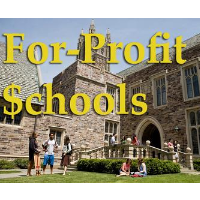Corinthian Closing What's Left of Its Battered For-Profit College Chain

School’s out for the last of the for-profit Corinthian Colleges that have been hammered by state and federal authorities for the past two years over questionable programs and predatory loan practices.
Orange County-based Corinthian announced that its 28 remaining institutions of higher learning, often located in strip malls and office parks, are closing today, stranding their 16,000 students. The company operates campuses under the name of Everest College, WyoTech and Heald in California, Hawaii, Arizona, Oregon and New York.
The one-time largest for-profit college chain in the country agreed to sell more than half of its 107 campuses late last year amid lawsuits over phone job-placement claims, fudged grades and fabricated attendance. The writing was on the wall last summer when the U.S. Department of Education froze the student loan and grant money that had been Corinthian’s life blood.
Corinthian has been in the eye of the storm since then-U.S. Senator Tom Harkin (D-Iowa) released a scathing report (pdf) of the for-profit college industry in 2012 that accused it of preying on non-traditional students, often low-income and a minority.
Corinthian was sued the next year by California Attorney General Kamala Harris, who revealed internal company documents that described the college’s targeted demographic as “isolated,” “impatient,” individuals with “low self-esteem,” who have “few people in their lives who care about them” and who are “stuck” and “unable to see and plan well for future.”
NASDAQ delisted the company in February, about the same time the state cut off Cal Grants for 4,500 Heald students.
The U.S. Department of Education fined Corinthian $30 million earlier in the month for multiple transgressions, including the misstatement of graduation and job placement rates that investors and students use to evaluate it. The department forbid Corinthian’s 10 Heald College campuses from enrolling new students.
The innovative, outside-the-box business plan was lucrative for years. For-profit companies like Corinthian target low-income students and veterans because they have access to state and federal education financial assistance. Federal money accounted for nearly half of Corinthian’s annual revenue.
At the end, Corinthian posted a notice on its webpage with a denial that it had performed badly and deserved to be closed. “Overall, our schools did a good job for the students they served. We made every effort to address regulators’ concerns in good faith. Neither our Board of Directors, our management, our faculty, nor our students believe these schools deserved to be forced to close.”
While Corinthian doesn’t feel that it deserves to be closed, its students and former students believe they shouldn’t have to pay for their educational experience. The Los Angeles Times says that students attending schools that get shut down in this manner generally have their loans forgiven. But that might not extend to the private, third-party loans that Corinthian facilitated for many of its students. For them, the learning experience may last for years.
–Ken Broder
To Learn More:
Corinthian Colleges—Including Heald in Rancho Cordova and Roseville—Closing Monday (by Marissa Lang, Sacramento Bee)
Corinthian Shuts All Campuses, Ending College for 16,000 (by Chris Staiti and Bruce Rule, BloombergBusiness)
Corinthian Colleges to Shut Down More Than Two Dozen Remaining Schools (by Chris Kirkham, Los Angeles Times)
Feds Bar New Students at For-Profit Heald Colleges and Fine Parent Corinthian $30 Million (by Ken Broder, AllGov California)
- Top Stories
- Controversies
- Where is the Money Going?
- California and the Nation
- Appointments and Resignations
- Unusual News
- Latest News
- California Forbids U.S. Immigration Agents from Pretending to be Police
- California Lawmakers Urged to Strip “Self-Dealing” Tax Board of Its Duties
- Big Oil’s Grip on California
- Santa Cruz Police See Homeland Security Betrayal in Use of Gang Roundup as Cover for Immigration Raid
- Oil Companies Face Deadline to Stop Polluting California Groundwater





